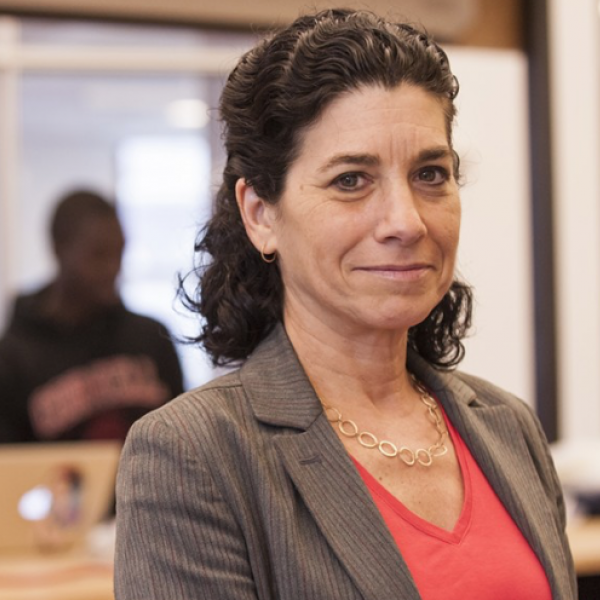Deborah Estrin, the Robert V. Tishman '37 Professor of Computer Science at Cornell Tech and of healthcare policy and research at Weill Cornell Medicine, has been awarded a 2018 MacArthur Foundation fellowship for her innovative work using mobile devices and data to address social challenges.
Estrin, who also serves as an associate dean at Cornell Tech, is one of 25 fellows to receive a no-strings-attached award of $625,000 over five years – widely known as the “genius grant.”
“I was and remain very humbled and grateful,” said Estrin, who thought at first the foundation was calling her to provide a reference for someone else. “I feel a sense of commitment to do good by it, and to live up to it.”
MacArthur Foundation
The MacArthur Foundation recognized Estrin for demonstrating “a remarkable ability to anticipate the applicability of technological advances to a variety of fields.” In recent years, her work has focused on what she calls “small data” – the digital breadcrumbs we leave as we go about our lives – and how they can be leveraged for such uses as personalized health care management, without sacrificing privacy.
The foundation hailed Estrin as among the first to see the potential in using the digital traces from personal electronic devices such as cell phones, GPS and fitness trackers, and tools like email and online maps and shopping, for participatory mobile health.
“It’s not just where we’ve been or whether we’re walking or sitting. It’s the language we use, it’s how much time we spend binging on whatever’s on at night, the news we consume, the sentiments in the things we post,” Estrin said. “We are all so individual in ways that our genetics alone can’t predict. The small data from mobiles and from online interactions are rich sources of data that can close the gap between what we are born with and what we suffer from.”
Estrin directs Cornell Tech’s Small Data Lab, where researchers develop platforms and applications for management and use of personal data, such as using retrospective data to generate personalized models that can detect changes in health in response to treatment or disease progression. She also founded the Health Tech Hub at the Jacobs Technion-Cornell Institute.
“Deborah Estrin has been a trailblazer and pioneer throughout her career, and her current focus in health tech offers a terrific example: Through her work and research in small data, she is improving the lives of patients, doctors, caregivers and all of us,” said Dan Huttenlocher, the Jack and Rilla Neafsey Dean and vice provost of Cornell Tech. “My colleagues and I congratulate Deborah on this great and very well-deserved honor. Through her leadership at Cornell Tech as associate dean and the director of the Health Tech program in the Jacobs Technion-Cornell Institute, Deborah has established the new campus as an international leader in tech for social impact, and she is driving the next generation of innovators who will revolutionize the health care industry.”
Huttenlocher, who is chair of the board of directors of the MacArthur Foundation, was not involved in selecting the grant awardees.
In 2011, Estrin co-founded the nonprofit startup Open mHealth, an open-source software architecture that can use various types of small data to build customized applications addressing specific health conditions.
“We are all so individual in ways that our genetics alone can’t predict. The small data from mobiles and from online interactions are rich sources of data that can close the gap between what we are born with and what we suffer from.”
“The same data that is useful to help understand how someone is responding to a therapy or a drug is also data that can be very exposing about them. I am interested in developing new ways to put these data and technologies to use in a way that is more privacy-aware from the perspective of the user and context than is typical in our social media-dominated online lives,” she said.
Estrin received her B.S. in electrical engineering and computer science from the University of California, Berkeley (1980) and her M.S. (1982) and Ph.D. (1985) in electrical engineering and computer science from the Massachusetts Institute of Technology. Before joining Cornell’s faculty in 2013, she was a professor in the computer science department at the University of California, Los Angeles. From 2002 to 2012, she was the founding director of the Center for Embedded Network Sensing, a National Science Foundation Science and Technology Center headquartered at UCLA.
“I’ve been working as a technologist throughout these amazing decades in which digital technology has evolved so much and become so pervasive. The opportunities for addressing societal needs have been plentiful, at the same time that the technology raises its own social challenges,” Estrin said.
At this point in her career, she said the award affords her the “license and impetus to really dig in, rather than take a back seat.” She hopes to use the recognition from the fellowship to put her ideas into wider practice.
“I believe we can use small data to make chronic disease prevention and management personalized, scalable and affordable, but it’s not as if you point this out to people and it becomes true,” she said. “I hope I can take advantage of this opportunity to really navigate what it’s going to take to make it true. To make it a reality, not just a possibility.”



